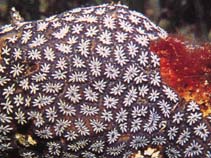Botryllus schlosseri (Pallas, 1766)
Golden star tunicate| Native range | All suitable habitat | Point map | Year 2050 |

|
| This map was computer-generated and has not yet been reviewed. |
| Botryllus schlosseri AquaMaps Data sources: GBIF OBIS |
Classification / Names Common names | Synonyms | CoL | ITIS | WoRMS
Ascidiacea | Stolidobranchia | Styelidae
Environment: milieu / climate zone / depth range / distribution range Ecology
Sessile; depth range 0 - 100 m (Ref. 1603). Temperate; 71°N - 38°S, 180°W - 180°E
Distribution Countries | FAO areas | Ecosystems | Occurrences | Introductions
Cosmopolitan.
Length at first maturity / Size / Weight / Age
Maturity: Lm ? range ? - ? cm Max length : 5.0 cm TL male/unsexed; (Ref. 1603)
Life cycle and mating behavior Maturity | Reproduction | Spawning | Eggs | Fecundity | Larvae
Main reference
References | Coordinator | Collaborators
Jagerskiold, L.A. 1971 A Survey of the Marine Benthoic Macrofauna along the Swedish West Coast 1921-1938. Acta Regiae Societatis Scientiarum et Litterarum Gothoburgensis. Zoologica 6:1-146. (Ref. 1369)
IUCN Red List Status
(Ref. 130435: Version 2025-1)
CITES status (Ref. 108899)
CMS (Ref. 116361)
Threat to humans
Human uses
| FishSource |
Tools
More information
Diet composition
Food consumption
Predators
Max. ages / sizes
Length-weight rel.
Length-length rel.
Length-frequencies
Mass conversion
Abundance
Internet sources
BHL | BOLD Systems | CISTI | DiscoverLife | FAO(Publication : search) | Fishipedia | GenBank (genome, nucleotide) | GloBI | Gomexsi | Google Books | Google Scholar | Google | PubMed | Tree of Life | Wikipedia (Go, Search) | Zoological Record



